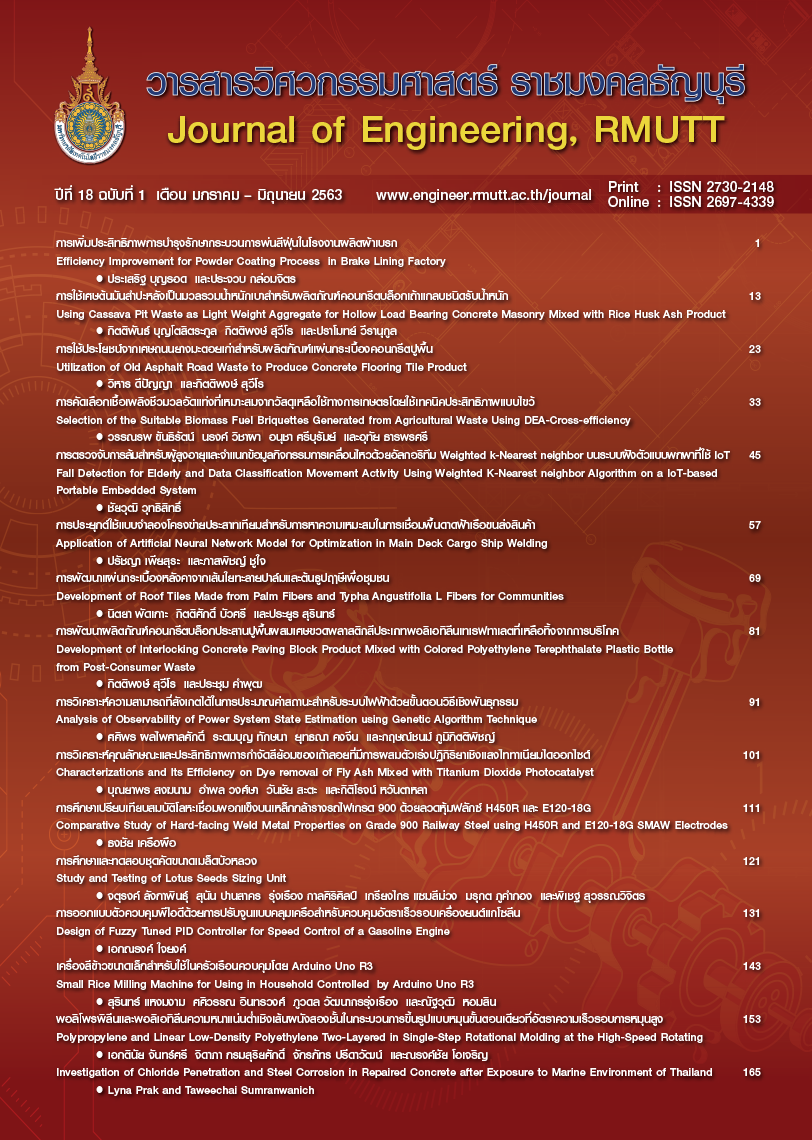Design of Fuzzy Tuned PID Controller for Speed Control of a Gasoline Engine
Main Article Content
Abstract
The objective of this research was to design a controller for speed control of a gasoline engine. The proposed control scheme was a fuzzy PID controller with adaptive gains. It had two inputs, the error and the rate of change of error. The controller outputs were Kp Ki and Kd gains. The control rules were created from 25 linguistic conditions. In this research, the Crossley and Cook’s gasoline engine models and the corresponding parameters were employed by using MATLAB program. Performance of the proposed controller was compared with that of the fuzzy PI controller, PID controller, and PI controller. It appeared from simulations that the output of the proposed controller could reach a constant speed reference input as the fastest at 1.46 seconds, with no overshoot. The breaking disturbance was rejected within 2.35 seconds.
Article Details
The manuscript, information, content, picture and so forth which were published on Frontiers in engineering innovation research has been a copyright of this journal only. There is not allow anyone or any organize to duplicate all content or some document for unethical publication.
References
Radhi RM , Hussien EQ. Controller modelling and design of rotational speed for internal combustion engine. Thi-Qar Univ J Eng Sci. 2013;4(2):1–13.
Rohit M, Rohit K. Modelling and simulation of spark ignigition engines. Int J Adv Res Technol. 2014;3(5):55–93.
AHMED FS. Modeling, simulation and control of the air-path of an internal combustion engine [Internet]. Universitéde Technologie de Belfort-Montbeliard; 2014. Available from: https://tel.archives-ouvertes.fr/tel-01002113
Isermann R. General combustion engine models. In: Engine modeling and control: modeling and electronic management of internal combustion engines.New York: Springer; 2014. p. 133–266. [5]Crossley PR, Cook JA. A nonlinearenginemodelfordrivetrain system development. In: International Conference on Control 1991 Control ’91 [Internet]. Edinburgh, UK: IET; 1991. p. 921–5. Available from: https://ieeexplore.ieee.org/stamp/stamp.jsp?arnumber=98573
Quinn S, Grace A, Barnard P, Michaels L, Aldrich BI. Enginemodel. In: Using simulink and stateflow ® tmin automotive applications abstract [Internet]. Massachusetts, USA: TheMath Works Inc.; 1998. p. 8–17. Available from: https://www.computoolable.nl/AuM5.pdf
Spear B. James Watt: The steam engine and the commercializationof patents. World Pat Inf. 2008 Mar;30(1):53–8.
Choi S-B, Hedrick JK. Robust throttle control ofautomotive engines: theory and experiment. ASME J Dyn Syst Meas Control [Internet]. 1996;118:92–8. Available from: http://www.asme.org/terms/Terms_Use.cfm
Rout MK, Sain D, Swain SK, Mishra S K. PID controller design for cruise control system using genetic algorithm. In: 2016 International Conference on Electrical, Electronics, and Optimization Techniques (ICEEOT). Chennai, India: IEEE; 2016. p. 4170–4.
Gritli W, Gharsallaoui H, Benrejeb M. PID-type fuzzy scaling factors tuning using genetic algorithm and simulink design optimization for electronic throttle valve. In: International Conference on Control, Decision and Information Technologies (CoDIT). St. Julian’s, Malta: IEEE; 2016. p. 216–21.
Tran TA, Haidara G. A research on marine diesel engine speed controller by fuzzy logic control theory based on experimental investigation. J Mech Eng Res Dev. 2019;42(2):18–26.
Chao C-T, Sutarna N, Chiou J-S, Wang C-J. An optimal fuzzy PID controller design based on conventional PID control andnonlinear factors. Appl Sci. 2019;9(6).
Linjing H, Yuezhen W. Design and simulate the idle speed control system based on fuzzy adaptive. In: Advanced Information Technology, Electronic and Automation Control Conference (IAEAC). Chongqing, China: IEEE; 2015. p. 714–7.
Mu H, Li X, Tang J. Study with fuzzy self-turning PID controller on idle speed controlling of automobile. In: 2017 Chinese Automation Congress (CAC). Jinan, China: IEEE; 2017. p. 5755–9.


